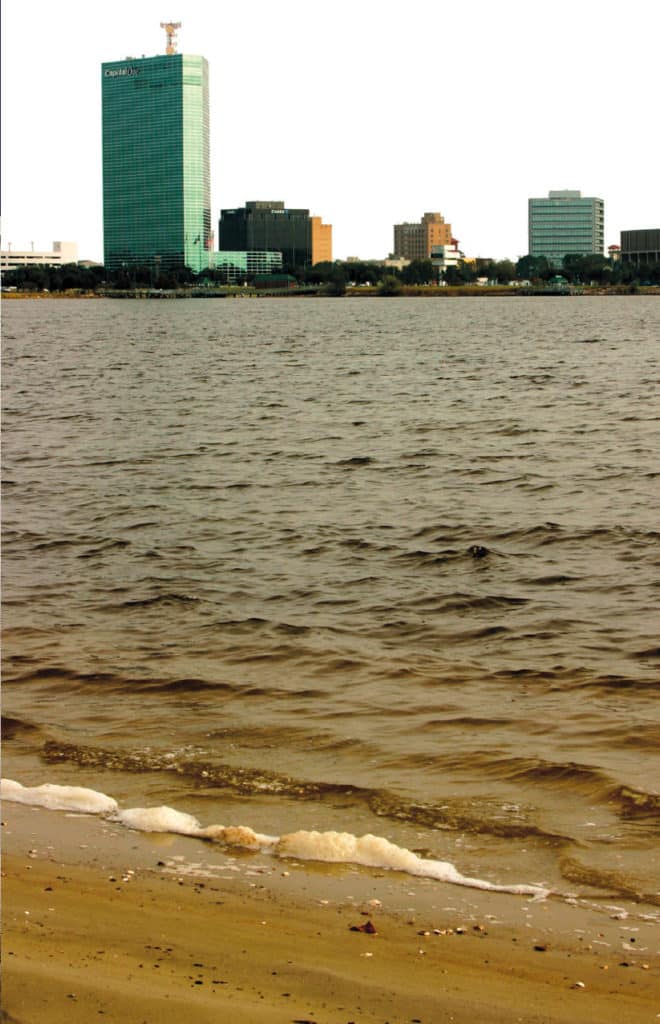Just When You Thought It Was Safe To Go In The Water
By Kerri Cooke
Summer is synonymous with beaches and bikinis. The hot weather of Southwest Louisiana makes swimming an ideal activity to engage in during the sweltering months, since it’s hard to do anything else comfortably outside.
As you pack up your picnic lunches, sunscreen and beach towels, you may want to be aware of the current safety conditions of the beach you’re visiting.

The Beaches Environmental Assessment and Coastal Health Act, the BEACH Act, was signed into law by President Bill Clinton on October 11, 2000. It was an effort to improve on the Clean Water Act. The BEACH Act led to the EPA’s creation of a system for testing and monitoring public coastal waterways all around the country for dangerous bacteria levels in order to notify the public of any increased risk it faced when swimming.
The waterways monitored are beaches around most coastal states, beaches of states bordering the Great Lakes and the water around islands that are American territories.
The EPA gives grants to the states and territories that meet the criteria so that each state or territory can sustain programs to keep their citizens free of disease.
When bacteria reach a high enough level, a beach advisory is issued by the Department of Health. This advisory doesn’t close the beach; rather, it informs the public of the increased health risk. Therefore, swimmers swim at their own risk in full knowledge of the conditions.
The Natural Resource Defense Council’s beach water quality report in 2014 ranked Louisiana as 26 out of the 30 states monitored. This means our state had a very high number of water samples exceeding federal recommendations.
The Louisiana Department of Health has 24 test sites across the state that they monitor during peak season — May through October.
With the many beaches in Southwest Louisiana and many instances of heavy rain in the area, we need to be more aware of the risks that come with bacteria in the water. Elevated levels of enterococci and fecal coliform bacteria usually occur after heavy rainfall, and are mainly due to sewage pollution. The run-off from the rain can carry sewage from improperly working sewer systems or farmlands with a high level of animal waste. Other causes can be fertilizer finding its way into the water or trash and waste left at a beach site.
Some solutions to contaminated beaches have been to better monitor sewage systems, conserve wetlands — since they help filter runoff after rainfall, and run run-off through vegetation rather than let it just drain off concrete.
Health officials say it is advisable to delay swimming at a beach after big storms when bacteria levels will be at their highest. However, if you do want to swim, you should be aware of the health risks. The healthy swimmer is the one who is least likely to encounter problems while swimming in waters during an advisory. But people with health concerns, weakened immune systems or open wounds would do well to avoid contaminated water. Also, the elderly, pregnant women and the very young are at an increased risk.
You can lessen the risk by not putting your head under the water so that the bacteria can come in contact with your eyes, nose or mouth. You don’t want to accidentally ingest the water.
Also, if you do have a wound, clean it immediately after swimming.
Showering immediately after recreation is advised for all swimmers.
Bacteria can cause infections, rashes, and occasionally, diseases. However, most of the time, if you happen to get sick, the effects of the bacteria are minor and require little or minimal treatment. Problems can be rectified by antibiotics from your doctor.
The most common sickness caused by beach bacteria is gastroenteritis — the stomach flu. It can cause nausea, vomiting, stomach ache, fever, diarrhea or headache. Also, ear, nose, and throat infections can occur after one’s head is submerged.
As far as the statistics go on local beaches, last year, Lake Charles’ North Beach was under advisory for 44 percent of the season, Lake Charles’ South Beach for 52 percent, Lefleur Beach for 46 percent and Rutherford for 54 percent. The highest percentage in the area was at Holly Beach, with one test site being under advisory for 77 percent of the season.
These figures show that sewage run-off into local waterways is very common. The recent heavy rains in the Lake Charles area have caused advisories to go up on the Lake Charles North and South Beaches. These were still up as late as the week of May 21.
Even Galveston, a city built on beach tourism, struggles with high bacteria levels after heavy rains.
Another question is: if the water is contaminated with high levels of bacteria, is it safe to eat the seafood that comes out of it? The answer is yes. If you thoroughly wash and cook the seafood, there is no health risk. That being said, eating raw oysters harvested during an advisory is a different story, since there is no cooking that will kill the bacteria.
The Louisiana Dept. of Health makes weekly posts on the status of local beaches. You can find these at new.dhh.louisiana.gov/index.cfm/page/288.
Does all of this mean you need to change your summer plans? Not necessarily. Each individual has to access the risks they are willing to take. While it is not advisable for people with pre-existing conditions to enter contaminated water, healthy individuals usually will not get sick. The possibility of sickness is obviously there. But if you take precautions, the likelihood of illness is low.
However, that doesn’t negate the fact that there’s some nasty stuff in the water. If you can get over the idea of there being some sewage run-off in the water, then have as much fun as you can. Even if you happen to get sick, it shouldn’t be serious.
Ultimately, you should be aware of the beach conditions, make decisions accordingly, take precautions and enjoy your day at the beach without fear.















Comments are closed.